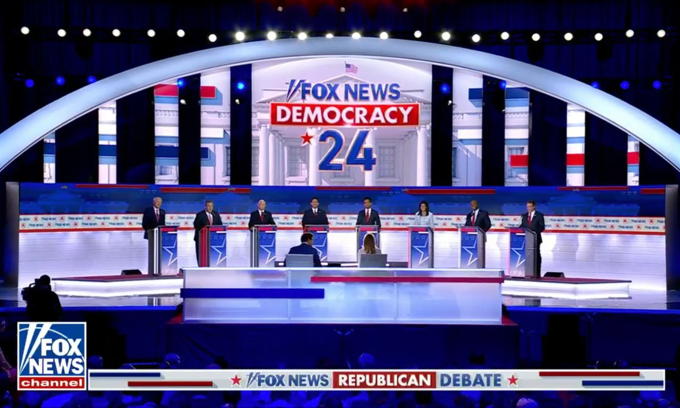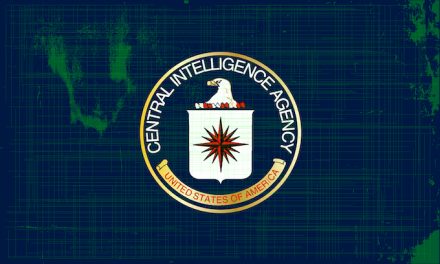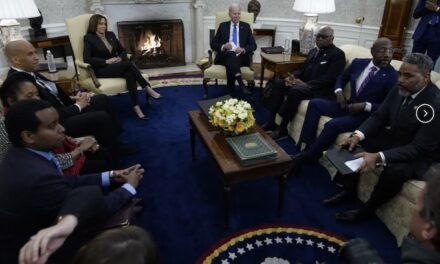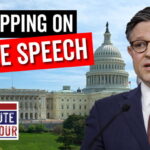Sometimes, absence can define a presence. Artists talk about negative space–the emptiness around an image. Theologians speak of via negativa–the study of God through the study of what He isn’t.
As Republicans gear up for the second debate, the big story for many observers is another defining absence—former President Trump didn’t show up to the first debate on Aug. 23 in Milwaukee, and he’s not expected to appear in Simi Valley on Sept. 27.
He has taken issue with a loyalty pledge to the eventual GOP nominee he’d have to sign to appear on stage. The man who ran for the Reform Party’s nomination in 2000 seems to be keeping his options open—and it’s hard not to see why.
Even as he faces multiple criminal indictments and a potential gag order, his poll numbers have strengthened; meanwhile, those of his chief rival, Florida Gov. Ron DeSantis, have shrunk.
The Trump-shaped void at the Fiserv Forum in Milwaukee was a big deal. But other, smaller omissions and vacuums stood out to many observers, too.
These topics and questions didn’t come up during the first debate:
Vaccines, Mandates, and Masks
On X (formerly Twitter), one user, Marnie Lopez, responded to a question from The Epoch Times’ Janice Hisle about the questions missing from debate number one with three words:
“Vaccines[.] Mandates[.] Masks[.]”
Moderator Martha MacCallum did bring up the COVID-19 lockdowns, asking former Vice President Mike Pence, “How much of what we are seeing happening around this country is a result of those COVID lockdowns? And is your administration in part to blame for how we got here?”
In response to a question on education, Gov. DeSantis said that the Sunshine State “stood up for what was right,” opening schools in August 2020 while taking serious heat for the decision.
Yet, mask and vaccine mandates didn’t come up during the first debate. Neither did the adverse reactions many Americans reported after COVID-19 vaccination.
The American broadcast media’s reliance on direct-to-consumer drug ads could blunt the sharpest questions about Big Pharma’s impact on American politics, not to mention the Trump administration’s accelerated effort to develop COVID-19 vaccines, Operation Warp Speed. If these or similar issues come up in later debates, they could prove challenging for former Vice President Pence and Mr. Ramaswamy, a pharmaceutical industry veteran who participated in Ohio’s COVID-19 task force.
Though COVID-19-related restrictions have mostly disappeared from the headlines, they may soon return to the fore. Rising case numbers have led hospitals, schools, and other businesses and institutions to reinstate mask mandates.
‘Would You Pardon President Trump?’
One of the first debate’s most dramatic exchanges came after moderator Brett Baier asked the candidates about a potential criminal conviction of former President Trump.
“If former President Trump is convicted in a court of law, would you still support him as your party’s choice?” Mr. Baier asked.
Ms. MacCallum later asked the men and woman, in Milwaukee, if former Vice President Pence “did the right thing” on Jan. 6, 2021.
But many viewers may have wondered about a different question, one that Mr. Ramaswamy batted over the net to former Vice President Pence.
“Why don’t you say this? Join me in making a commitment… that on day one, you would pardon Donald Trump,” he asked.
While one past Republican president, Richard Nixon, famously received a pardon from his former second-in-command, President Gerald Ford, former Vice President Pence was non-committal.
“If I’m president of the United States, we’ll give fair consideration to any pardon request,” he said. He stated that such a move “usually follows a finding of guilt and contrition by the individual that’s been convicted.”
Many Americans may wonder where all the GOP hopefuls stand on a possible Trump pardon.
Jeffrey Epstein and Ghislaine Maxwell
Five minutes before the first debate, journalist Tucker Carlson aired an attention-getting interview with former President Trump on X.
One memorable question concerned the deceased sex offender Jeffrey Epstein. Rumors have swirled around Mr. Epstein’s fate since August of 2019. He was found dead in a Manhattan jail cell a month after his arrest in an investigation of a child sex-trafficking ring thought to involve some of the most powerful people in the world.
The City of New York’s chief medical examiner found that his cause of death was suicide by hanging.
“Do you think Epstein killed himself?” Mr. Carlson asked Mr. Trump during the Aug. 23 interview.
“I don’t know,” President Trump responded. “I will say, he was a fixture in Palm Beach. I don’t know what [former Attorney General Bill] Barr said about it. What did he say? He killed himself, probably?”
Former Attorney General Barr’s father, Donald Barr, was the headmaster at an elite New York City prep school, the Dalton School, around the time a young Mr. Epstein was hired by the same institution as a math teacher.
Americans who wonder what happened to Mr. Epstein may also raise questions about his associate, Ghislaine Maxwell, the daughter of businessman and alleged spy Robert Maxwell and the sister of World Economic Forum Technology Pioneer Isabel Maxwell.
In 2022, Judge Alison Nathan, then a district court judge, sentenced Ms. Maxwell to 20 years in prison and fined her $750,000 for her role in the sex trafficking scheme with Mr. Epstein. Judge Nathan now serves on the Second Circuit Court of Appeals. Ms. Maxwell has appealed Judge Nathan’s sentence.
The names of many Epstein associates have reached the public, including through recent reporting in The Wall Street Journal. Yet, no alleged clients in his pedophilia scheme have been criminally charged or convicted.
Mr. Ramaswamy has vowed to publicize an alleged full “client list” of Mr. Epstein’s if he reaches the Oval Office.
Central Bank Digital Currencies and the US Surveillance State
Another X user responded to Ms. Hisle’s post on neglected topics in the first debate with a long list of possible subjects. Central bank digital currencies, or CBDCs, were among them.
The Federal Reserve is considering the possibility of introducing such a digital asset. Critics warn CBDCs could infringe on Americans’ Fourth Amendment rights and other constitutional guarantees.
“It’s absolutely the best tool for a surveillance state you can buy,” Idaho state Rep. Ted Hill, a Republican, told The Epoch Times for an August article.
He warned that CBDCs could enable the state to “know just how many rounds of ammunition you purchased” and “track everything you do.”
Although he will not appear at the debate in Simi Valley, Democratic hopeful Robert F. Kennedy, Jr. has opposed CBDCs, stating they could “grease the slippery slope to financial slavery and political tyranny.”
More generally, government surveillance and individual privacy did not take center stage in Milwaukee.
On X, user “NateCog” put forth one possible question: “Many voters believe the [U.S.] is becoming a repressive surveillance state. What, specifically, would you do as president to roll back the weaponized deep [state] and restore liberties for all?”
Relatedly, Republicans’ oft-voiced concerns that federal law enforcement is being weaponized for political purposes did not make the moderators’ questions, though Mr. Ramaswamy, Gov. DeSantis, and Sen. Tim Scott (R-S.C.) all brought it up in their answers (all in strikingly similar language.)
Election Integrity, Censorship, and More
It’s impossible to name every single relevant issue that was absent, or mostly absent, from the debate in Milwaukee. Here’s a quick list of a few big ones, some courtesy of X users:
Election integrity after the 2020 presidential election and Republicans’ prospective attempts at legal ballot harvesting as legal disputes over those tactics may loom
Censorship on social media, as well as controversial contacts between federal agencies and social media sites
Trade and tariffs
Industrial policy, now a hot topic as politicians and economists debate the best approach for addressing China’s dominant position in many key sectors
The limits to legal immigration, especially as the Biden administration uses various maneuvers to provide legal pathways for those who illegally entered or inhabit the United States—for example, extending Temporary Protected Status to migrants from Venezuela and elsewhere



















AND Don will be skipping it yet again.
BIG MISTAKE IMO>